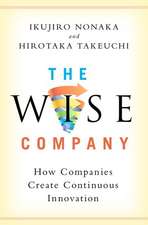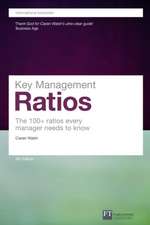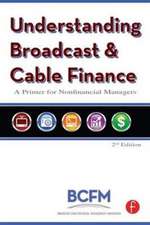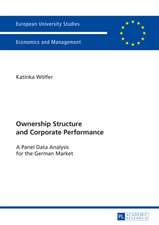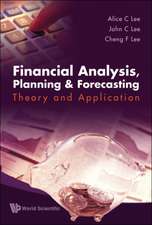Mastering Risk Modelling: A Practical Guide to Modelling Uncertainty with Microsoft Excel: Financial Times
Autor Alastair Dayen Limba Engleză Paperback – 30 iun 2009
It covers:
. Review of model design
. Risk and uncertainty
. Credit risk
. Project finance
. Financial analysis
. Valuation
. Options
. Bonds
. Equities
. Value at risk
. Simulation
This second edition contains brand new chapters:
. Revised models
. More material on credit risk modelling e.g. portfolios, bankruptcy models
. Shows dual 2003/2007 Excel key strokes
. More theory especially on statistics in Excel
. Basic statistics in Excel - tools and methods
. Capacity to borrow and repay
. Finding optimum mix of risk and return
. Fixed income risk models
. Visual Basic approach
Preț: 436.25 lei
Preț vechi: 538.59 lei
-19% Nou
Puncte Express: 654
Preț estimativ în valută:
83.47€ • 87.15$ • 69.09£
83.47€ • 87.15$ • 69.09£
Carte disponibilă
Livrare economică 15-29 martie
Livrare express 01-07 martie pentru 39.33 lei
Preluare comenzi: 021 569.72.76
Specificații
ISBN-13: 9780273719298
ISBN-10: 0273719297
Pagini: 408
Dimensiuni: 168 x 236 x 23 mm
Greutate: 0.71 kg
Ediția:Nouă
Editura: FT Press
Seria Financial Times
Locul publicării:Harlow, United Kingdom
ISBN-10: 0273719297
Pagini: 408
Dimensiuni: 168 x 236 x 23 mm
Greutate: 0.71 kg
Ediția:Nouă
Editura: FT Press
Seria Financial Times
Locul publicării:Harlow, United Kingdom
Descriere
Risks are everywhere in the business world. Mastering Risk Modelling provides the busy financial manager with useful tips andpractical templates for assessing, applying and modelling risk and uncertainty in Excel. The book is designed specifically to be of help to you if you don’t have time to start from scratch – it will improve your abilities in Excel and give you a library of basic examples that you can use as a basis for further development.
It covers:
• Review of model design
• Risk and uncertainty
• Credit risk
• Project finance
• Financial analysis
• Valuation
• Options
• Bonds
• Equities
• Value at risk
• Simulation
This second edition contains brand new chapters:
• Revised models
• More material on credit risk modelling e.g. portfolios, bankruptcy models
• Shows dual 2003/2007 Excel key strokes
• More theory especially on statistics in Excel
• Basic statistics in Excel – tools and methods
• Capacity to borrow and repay
• Finding optimum mix of risk and return
• Fixed income risk models
• Visual Basic approach
It covers:
• Review of model design
• Risk and uncertainty
• Credit risk
• Project finance
• Financial analysis
• Valuation
• Options
• Bonds
• Equities
• Value at risk
• Simulation
This second edition contains brand new chapters:
• Revised models
• More material on credit risk modelling e.g. portfolios, bankruptcy models
• Shows dual 2003/2007 Excel key strokes
• More theory especially on statistics in Excel
• Basic statistics in Excel – tools and methods
• Capacity to borrow and repay
• Finding optimum mix of risk and return
• Fixed income risk models
• Visual Basic approach
Cuprins
Conventions
Overview
1 Introduction
Scope of the book
Example model
Objectives of risk modelling
Summary
2 Review of model design
Introduction
Design objectives
Common errors
Excel features
Formats
Number formats
Lines and borders
Colour and patterns
Specific colour for inputs and results
Data validation
Controls – combo boxes and buttons
Conditional formatting
Use of functions and types of functions
Add-ins for more functions
Text and updated labels
Recording a version number, author, etc.
Using names
Pasting a names table
Comment cells
Graphics
Dynamic graphs to plot individual series
Data tables
Scenarios
Spreadsheet auditing
Summary
3 Risk and uncertainty
Introduction
Risk
Uncertainty
Response to risk
Methods
Summary
4 Project finance
Introduction
Requirements
Advantages
Risks
Risk analysis
Risk mitigation
Financial model
Inputs
Sensitivity and cost of capital
Construction, borrowing and output
Accounting schedules
Management analysis and summaries
Summary
5 Simulation
Introduction
Building blocks
Procedure
Real estate example
Summary
6 Financial analysis
Introduction
Process
Environment
Industry
Financial statements
Profit and loss
Balance sheet
Operating efficiency
Profitability
Financial structure
Core ratios
Market ratios
Trend analysis
Cash flow
Forecasts
Financial analysis
Summary
7 Credit risk
Cash flow
Cover ratios
Sustainability
Beaver’s model
Bathory model
Z scores
Springate analysis
Logit analysis
H-Factor model
Ratings agency
Summary
References
8 Valuation
Introduction
Inputs
Cash flow
Capital structure
Valuation and returns
Sensitivity analysis
Management summary
Summary
9 Bonds
Introduction
Bond prices
Interest rates
Yield
Duration and maturity
Convexity
Comparison
Summary
10 Options
Introduction
Options
Options example
Options hedging strategy
Black–Scholes
Simulation options pricing
Binomial model
Summary
11 Real options
Introduction
Project
Option to delay
Option to abandon
Option to expand
Summary
12 Equities
Introduction
Historic data
Returns summary
Simulation
Portfolio
Summary
References
13 Risk adjusted returns
Introduction
Economic capital
Risk-adjusted return on capital (RAROC)
Summary
14 Value at risk
Introduction
Single asset model
Two assets
Three asset portfolio
Summary
15 Credit value at risk
Introduction
Portfolio approach
Overview of components
Single asset
Two-bond portfolio
Simulation
Summary
Appendix: software installation and licence
Index
Overview
1 Introduction
Scope of the book
Example model
Objectives of risk modelling
Summary
2 Review of model design
Introduction
Design objectives
Common errors
Excel features
Formats
Number formats
Lines and borders
Colour and patterns
Specific colour for inputs and results
Data validation
Controls – combo boxes and buttons
Conditional formatting
Use of functions and types of functions
Add-ins for more functions
Text and updated labels
Recording a version number, author, etc.
Using names
Pasting a names table
Comment cells
Graphics
Dynamic graphs to plot individual series
Data tables
Scenarios
Spreadsheet auditing
Summary
3 Risk and uncertainty
Introduction
Risk
Uncertainty
Response to risk
Methods
Summary
4 Project finance
Introduction
Requirements
Advantages
Risks
Risk analysis
Risk mitigation
Financial model
Inputs
Sensitivity and cost of capital
Construction, borrowing and output
Accounting schedules
Management analysis and summaries
Summary
5 Simulation
Introduction
Building blocks
Procedure
Real estate example
Summary
6 Financial analysis
Introduction
Process
Environment
Industry
Financial statements
Profit and loss
Balance sheet
Operating efficiency
Profitability
Financial structure
Core ratios
Market ratios
Trend analysis
Cash flow
Forecasts
Financial analysis
Summary
7 Credit risk
Cash flow
Cover ratios
Sustainability
Beaver’s model
Bathory model
Z scores
Springate analysis
Logit analysis
H-Factor model
Ratings agency
Summary
References
8 Valuation
Introduction
Inputs
Cash flow
Capital structure
Valuation and returns
Sensitivity analysis
Management summary
Summary
9 Bonds
Introduction
Bond prices
Interest rates
Yield
Duration and maturity
Convexity
Comparison
Summary
10 Options
Introduction
Options
Options example
Options hedging strategy
Black–Scholes
Simulation options pricing
Binomial model
Summary
11 Real options
Introduction
Project
Option to delay
Option to abandon
Option to expand
Summary
12 Equities
Introduction
Historic data
Returns summary
Simulation
Portfolio
Summary
References
13 Risk adjusted returns
Introduction
Economic capital
Risk-adjusted return on capital (RAROC)
Summary
14 Value at risk
Introduction
Single asset model
Two assets
Three asset portfolio
Summary
15 Credit value at risk
Introduction
Portfolio approach
Overview of components
Single asset
Two-bond portfolio
Simulation
Summary
Appendix: software installation and licence
Index
Textul de pe ultima copertă
Mastering Risk Modelling is a practical guide to modelling. It’s designed to provide useful templates for applying risk and uncertainty. The book:
· Improves financial managers’ abilities with Excel
· Demonstrates a systematic method of developing Excel models for fast development and reduced errors
· Provides a library of basic templates for further development all on an enclosed CD for immediate use
This fully revised and updated guide is an essential companion for all those who work with risk model design and those who want to build more complex models.
New material in this edition includes:
· Thoroughly revised models
· More material on credit risk modelling such as portfolios, VaR and bankruptcy models
· Dual 2003/2007 Excel key strokes
· The use of statistics in Excel - tools and methods
· Advice on capacity to borrow and repay
· Finding optimum mix of risk and return
· Fixed income risk models
· Visual Basic approach
· Improves financial managers’ abilities with Excel
· Demonstrates a systematic method of developing Excel models for fast development and reduced errors
· Provides a library of basic templates for further development all on an enclosed CD for immediate use
This fully revised and updated guide is an essential companion for all those who work with risk model design and those who want to build more complex models.
New material in this edition includes:
· Thoroughly revised models
· More material on credit risk modelling such as portfolios, VaR and bankruptcy models
· Dual 2003/2007 Excel key strokes
· The use of statistics in Excel - tools and methods
· Advice on capacity to borrow and repay
· Finding optimum mix of risk and return
· Fixed income risk models
· Visual Basic approach










